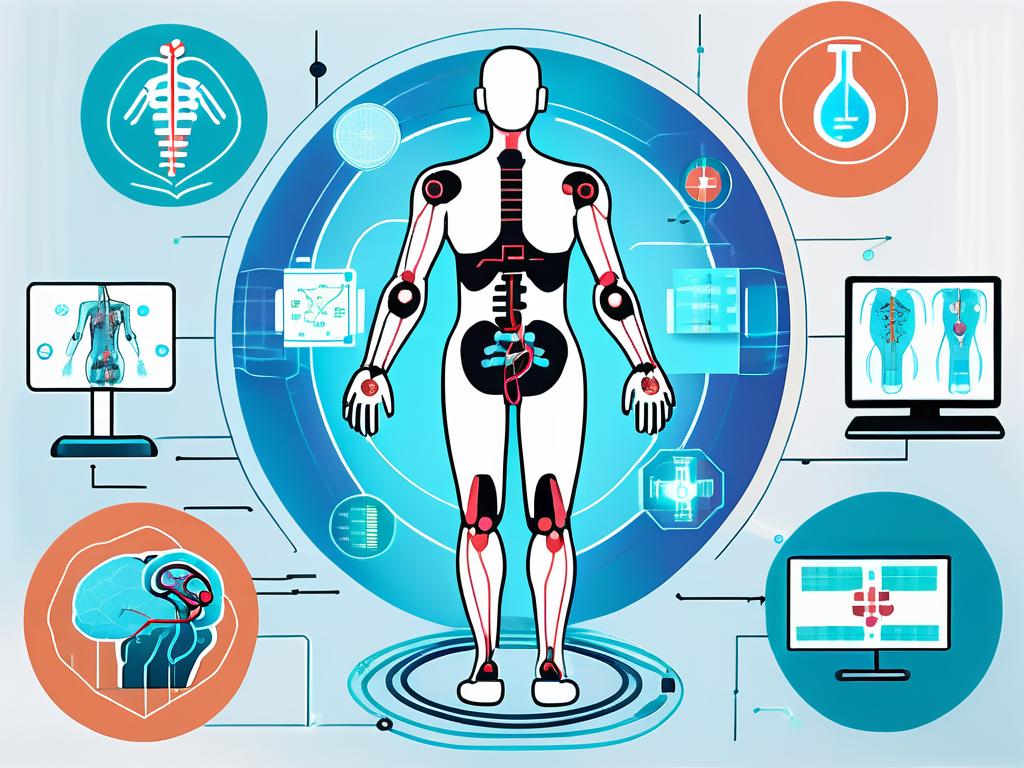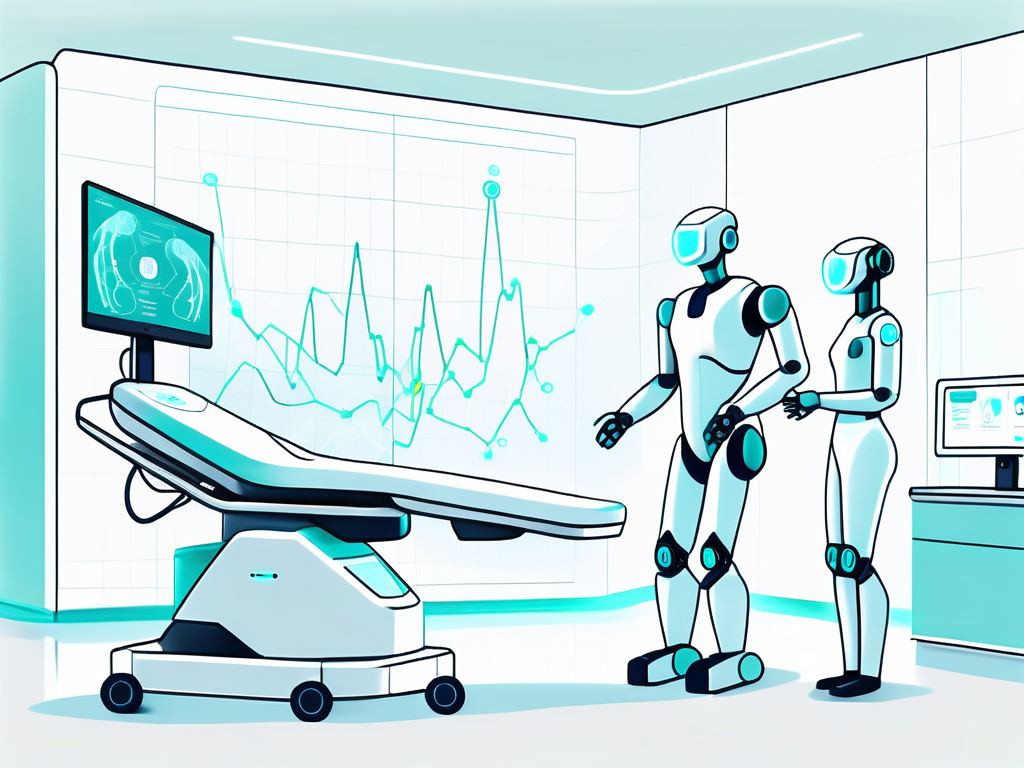In recent years, Artificial Intelligence (AI) has emerged as a powerful tool in various industries, revolutionizing the way businesses operate and enhancing efficiency. In the healthcare sector, AI is making significant strides, particularly in clinics, where it is being leveraged to improve patient satisfaction and provide support to the staff. This article delves into the role of AI in clinics, explores its functions, and discusses the potential impact on patient care and staff efficiency.
Understanding the role of AI in healthcare
The rise of AI in medical settings has opened up new possibilities and opportunities for improving patient outcomes. AI refers to the ability of machines and computers to mimic human intelligence and perform tasks that would typically require human intelligence.
When applied in healthcare settings, AI algorithms can analyze vast amounts of data and identify patterns, enabling healthcare professionals to make more accurate diagnoses and develop effective treatment plans. This technology has the potential to revolutionize patient care and significantly improve health outcomes.
Furthermore, the integration of AI in healthcare has paved the way for the development of innovative technologies such as virtual health assistants and remote monitoring systems. These advancements not only enhance the efficiency of healthcare delivery but also empower patients to take a more proactive role in managing their health.
The rise of AI in medical settings
In recent years, there has been an exponential increase in the use of AI in healthcare. According to a report by Grand View Research, the global AI in healthcare market is projected to reach $31.3 billion by 2025, growing at a CAGR of 41.5% from 2018 to 2025. This indicates the growing recognition of the potential benefits and value that AI brings to healthcare.
The adoption of AI technologies in medical settings is driven by the need to address challenges such as rising healthcare costs, increasing patient volumes, and the demand for personalised care. By leveraging AI tools, healthcare providers can optimise resource allocation, improve treatment outcomes, and enhance the overall patient experience.
Key functions of AI in clinics
AI serves several crucial functions in clinics, including improving patient satisfaction and providing support to the staff. Let’s delve deeper into how AI can enhance patient communication and diagnosis, streamline administrative tasks, and aid medical research and data analysis.
Moreover, AI-powered predictive analytics can help healthcare organisations identify high-risk patients, predict disease progression, and recommend tailored interventions. By harnessing the power of AI, healthcare providers can move towards a more proactive and preventive model of care, ultimately leading to better health outcomes and reduced healthcare costs.
Improving patient satisfaction with AI
Enhancing patient communication through AI
Effective and efficient communication between healthcare providers and patients is integral to delivering quality care and ensuring patient satisfaction. AI can play a significant role in enhancing patient communication by providing innovative tools and solutions.
For instance, AI-powered chatbots can assist patients by answering questions, providing appointment reminders, and offering educational information. These virtual assistants can be available 24/7, improving accessibility and providing immediate responses to patient queries.
Studies have shown that patients appreciate the convenience and promptness of AI-powered communication tools. According to a survey conducted by Accenture, 68% of patients are comfortable using AI to communicate with their healthcare providers, and 27% have already used AI-powered tools for healthcare-related purposes.
AI in patient diagnosis and treatment planning
AI algorithms have demonstrated remarkable accuracy in the analysis of medical images, such as X-rays, CT scans, and MRIs. By leveraging deep learning techniques, AI can detect abnormalities and assist radiologists and other healthcare professionals in making more precise diagnoses.
Moreover, AI can help generate treatment plans based on patient data and relevant medical research. By considering a vast amount of information and patient-specific factors, AI algorithms can provide personalized treatment recommendations, ultimately improving patient outcomes.
According to a study published in the journal Nature Medicine, a deep learning algorithm was able to diagnose skin cancer with a level of accuracy comparable to that of dermatologists. This highlights the potential of AI in enhancing diagnostic accuracy and streamlining treatment planning processes.
Furthermore, AI has the potential to revolutionize the field of telemedicine. Telemedicine refers to the remote diagnosis and treatment of patients using telecommunications technology. With the help of AI, healthcare providers can remotely monitor patients’ vital signs, analyze data, and provide real-time feedback and recommendations.
This technology can be particularly beneficial for patients in rural or underserved areas, where access to healthcare facilities may be limited. By leveraging AI-powered telemedicine solutions, patients can receive quality care without the need for extensive travel or long waiting times.
Additionally, AI can assist healthcare providers in managing and analyzing vast amounts of patient data. By using machine learning algorithms, AI can identify patterns and trends in patient information, enabling healthcare professionals to make data-driven decisions and provide personalized care.
Overall, AI has the potential to significantly improve patient satisfaction by enhancing communication, aiding in diagnosis and treatment planning, and revolutionizing telemedicine. As technology continues to advance, it is crucial for healthcare providers to embrace AI and leverage its capabilities to deliver better patient care.
AI as a tool for staff support
Streamlining administrative tasks with AI
Administrative tasks can be time-consuming and divert healthcare professionals’ attention away from patient care. AI can help streamline these tasks, freeing up valuable time and resources.
For example, AI-powered scheduling systems can optimize appointment bookings, considering factors such as patient preferences, staff availability, and clinic workflow. This reduces the likelihood of scheduling conflicts and minimizes wait times, enhancing the overall patient experience.
Furthermore, AI can automate routine administrative tasks, such as data entry, documentation, and billing, reducing the burden on clinic staff. This enables healthcare professionals to focus on delivering high-quality care and improves overall staff satisfaction.
Moreover, the implementation of AI in administrative processes can also lead to cost savings for healthcare facilities. By reducing the time spent on manual tasks, staff can be allocated more efficiently, potentially lowering operational costs in the long run. This cost-effectiveness allows healthcare organisations to reallocate resources to areas that directly benefit patient care, ultimately enhancing the quality of service provided.
AI in medical research and data analysis
The field of medical research generates vast amounts of data, making it intricate and time-consuming to analyze. AI algorithms can process and analyze large datasets rapidly, identifying patterns and insights that may not be immediately apparent to human researchers.
This technology can aid in drug discovery, clinical trial design and analysis, as well as the identification of risk factors and treatment effectiveness. By leveraging AI, researchers can expedite the discovery of new therapies and innovations, ultimately benefiting patients and advancing medical knowledge.
Furthermore, AI plays a crucial role in personalised medicine by analysing individual patient data to tailor treatments and interventions. This approach, known as precision medicine, considers a patient’s genetic makeup, lifestyle factors, and environmental influences to provide targeted and effective healthcare solutions. AI algorithms can sift through vast amounts of patient information to identify the most suitable treatment options, offering a more personalised and efficient approach to healthcare delivery.
Overcoming challenges in implementing AI in clinics
Addressing concerns about AI in healthcare
While the potential of AI in healthcare is vast, it is crucial to address concerns related to patient privacy, data security, and potential bias in algorithms. Healthcare organizations must establish robust ethical frameworks and secure systems to ensure patient data remains confidential and protected.
One of the key concerns surrounding AI in healthcare is the potential for bias in algorithms. Bias can arise from various sources, such as biased training data or biased programming. To address this, transparency in AI algorithms is essential. By making the inner workings of AI systems more transparent, healthcare professionals can detect and mitigate any biases or errors that may arise. Collaboration between regulatory bodies, healthcare professionals, and AI developers is vital in developing guidelines and best practices to ensure the responsible and safe use of AI in clinics.
Moreover, patient privacy and data security are paramount when implementing AI in clinics. Healthcare organizations must establish secure systems and protocols to protect patient data from unauthorized access or breaches. This includes implementing robust encryption methods, access controls, and regular security audits. By prioritizing patient privacy and data security, healthcare organizations can build trust and confidence among patients, encouraging wider adoption of AI technologies.
Strategies for successful AI integration
Successful integration of AI in clinics requires careful planning and strategic implementation. Healthcare organizations should invest in staff training and education to equip healthcare professionals with the necessary skills to work alongside AI technologies.
Collaboration with technology partners and digital marketing agencies focused on healthcare marketing can also play a crucial role in successful AI integration. These experts can assist clinics in identifying the most suitable AI solutions, implementing them effectively, and developing comprehensive marketing strategies to communicate the benefits of AI to patients and stakeholders.
Furthermore, leveraging data analytics and monitoring the performance of AI systems can provide insights into their effectiveness, enabling continuous improvement and refinement of processes. By analyzing data generated by AI systems, healthcare organizations can identify areas for improvement, optimize workflows, and enhance patient outcomes.
It is important to note that successful AI integration is an ongoing process. As technology advances and new challenges emerge, healthcare organizations must remain agile and adaptable. Regular evaluation and reassessment of AI systems, along with continuous training and education, will be crucial in harnessing the full potential of AI in clinics.
The future of AI in clinics
Predicted advancements in AI technology
As technology continues to advance, we can expect AI in clinics to become even more sophisticated and capable. Machine learning algorithms can become more accurate as they analyze larger datasets and gain more experience, improving diagnostic accuracy and treatment recommendations.
Furthermore, the integration of AI with other emerging technologies, such as robotics, Internet of Things (IoT), and telemedicine, can revolutionize the delivery of healthcare services. AI-powered robots can assist with routine tasks, monitor patients remotely, and deliver personalized care, enhancing patient experience and staff efficiency.
With the rapid development of AI technology, clinics can look forward to exciting advancements in the near future. Imagine a world where AI algorithms can not only accurately diagnose diseases, but also predict their progression and recommend the most effective treatment plans. This level of precision and foresight could potentially save countless lives and significantly improve patient outcomes.
Moreover, as AI continues to evolve, it has the potential to assist healthcare professionals in conducting groundbreaking medical research. By analyzing vast amounts of medical data, AI algorithms can identify patterns and correlations that may have previously gone unnoticed. This could lead to the discovery of new treatments, the development of more targeted therapies, and advancements in our understanding of complex diseases.
The potential impact on patient care and staff efficiency
The increasing use of AI in clinics has the potential to transform patient care. By improving communication, diagnosis, and treatment planning, AI can enhance patient satisfaction and ultimately lead to better health outcomes. The streamlining of administrative tasks with AI can also alleviate the burden on staff and allow them to focus on providing high-quality care.
Imagine a scenario where AI-powered chatbots are available 24/7 to answer patient queries, provide medical advice, and offer emotional support. This would not only improve patient experience but also reduce the strain on healthcare professionals who are often overwhelmed with the demands of their work. By automating repetitive administrative tasks, such as appointment scheduling and medical record management, AI can free up valuable time for clinicians to spend on direct patient care.
According to a report published by Accenture, AI applications in healthcare could create annual savings of $150 billion by 2026 in the United States alone. These savings can be reinvested into improving healthcare access, enhancing service quality, and fostering innovation.
However, it is important to acknowledge that the integration of AI in clinics also presents challenges. Privacy and data security are major concerns, as patient information needs to be safeguarded against unauthorized access. Additionally, the potential for bias in AI algorithms must be carefully addressed to ensure fair and equitable healthcare delivery for all patients.
In conclusion, leveraging AI in clinics can have a profound impact on patient satisfaction and staff support. Through advancements in patient communication, diagnosis, and treatment planning, as well as streamlining administrative tasks and aiding medical research, AI is transforming the healthcare landscape. However, challenges related to privacy, data security, and bias must be carefully addressed to ensure the responsible and ethical use of AI. With strategic implementation and collaboration with experts in healthcare marketing, clinics can harness the power of AI to improve patient care, enhance staff efficiency, and pave the way for a more promising future in healthcare.
Ready to elevate your clinic’s patient satisfaction and staff efficiency with the power of AI? At Clinic Marketing AI, we blend healthcare expertise with cutting-edge artificial intelligence to revolutionize your clinic’s operations. Our CEO, Angelo Rosati, brings a wealth of experience from the digital marketing realm to the dynamic world of health tech. We’re not just a service provider; we’re your partner in growth, committed to delivering excellence in every aspect. Book a Call with Us today, and together, let’s transform the future of Your Clinic.




